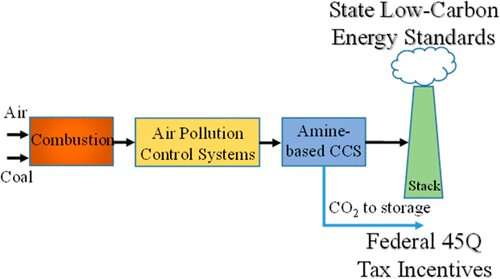Economic incentives for deploying carbon capture, sequestration in Wyoming

University of Wyoming researchers recently published a policy analysis article in an environmental research journal that examines the potential role of economic and policy incentives to facilitate carbon capture and storage (CCS) deployment in the state.
Haibo Zhai, the Roy and Caryl Cline Chair of Engineering, Environment and Natural Resources and an associate professor in the UW College of Engineering and Applied Science, led the study. The research, titled “Policy-Driven Potential for Deploying Carbon Capture and Sequestration in a Fossil-Rich Power Sector,” was published in the journal Environmental Science & Technology.
The study analyzes Wyoming as a fossil-rich power state seeking to generate reliable low-carbon electricity by 2030. The article examines the potential role of economic and policy incentives to facilitate CCS deployment for compliance with Wyoming law on reliable and dispatchable low-carbon energy standards.
The study suggests that CCS technology can be employed to deeply decarbonize some existing fossil fuel-fired power plants and provide firm generating capacity in a low-carbon power grid.
“The major objectives of this study are to assess the economic viability of CCS deployment in the state of Wyoming’s power sector to meet state-level low-carbon energy standards,” Zhai says. “We want to further evaluate the role of the federal tax credit for carbon sequestration in improving the retrofit viability.”
Zhai, postdoctoral Research Associate Abdallah Dindi and doctoral student Wanying Wu conducted the analysis in Zhai’s Laboratory for Low-Carbon Energy and Environmental Sustainability. SER Senior Adviser Kipp Coddington and Center for Energy Regulation and Policy Analysis (CERPA) Research Scientist Jada Garofalo collaborated on the project.
“It was a privilege for CERPA to collaborate with Dr. Zhai and his research team in this analysis, which included key energy policy aspects,” Coddington says. “CCS is a topic of great importance for the state of Wyoming, and we are hopeful that this paper contributes to advancing the technology here.”
While focused on Wyoming, the study will have wider impacts for other fossil-rich states hoping to use existing resources by highlighting the joint role of CCS-oriented federal and state regulations in improving retrofit viability while transiting to a low- or zero-carbon energy future, Zhai says.
“An electric power grid with high penetration of intermittent renewables will require other firm capacity to make electric power reliable, flexible and affordable,” Zhai adds. “A certain level of abated fossil fuels with CCS can play a firm role in the transition to a carbon-neutral power sector. Abated fossil fuels should not be excluded in climate action plans toward net-zero emissions, especially in fossil-rich states or regions.”
Zhai’s laboratory promotes a long-term vision for the role of both technology and policy to cope with complex energy, environmental and natural resource challenges.
Abdallah Dindi et al, Policy-Driven Potential for Deploying Carbon Capture and Sequestration in a Fossil-Rich Power Sector, Environmental Science & Technology (2022). DOI: 10.1021/acs.est.1c08837
Citation:
Economic incentives for deploying carbon capture, sequestration in Wyoming (2022, July 12)
retrieved 12 July 2022
from https://techxplore.com/news/2022-07-economic-incentives-deploying-carbon-capture.html
This document is subject to copyright. Apart from any fair dealing for the purpose of private study or research, no
part may be reproduced without the written permission. The content is provided for information purposes only.
For all the latest Technology News Click Here
For the latest news and updates, follow us on Google News.
